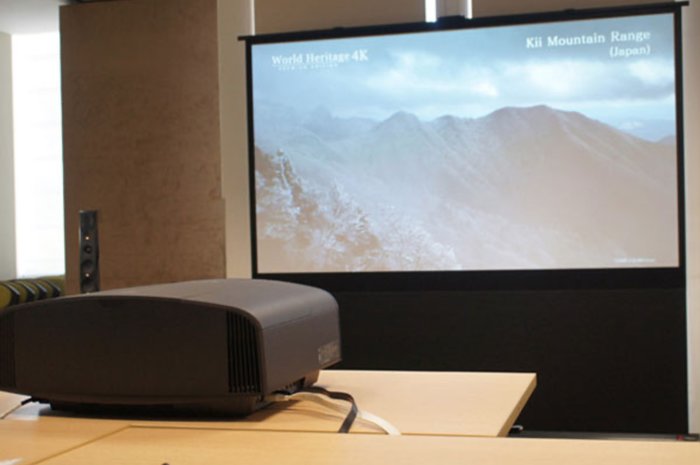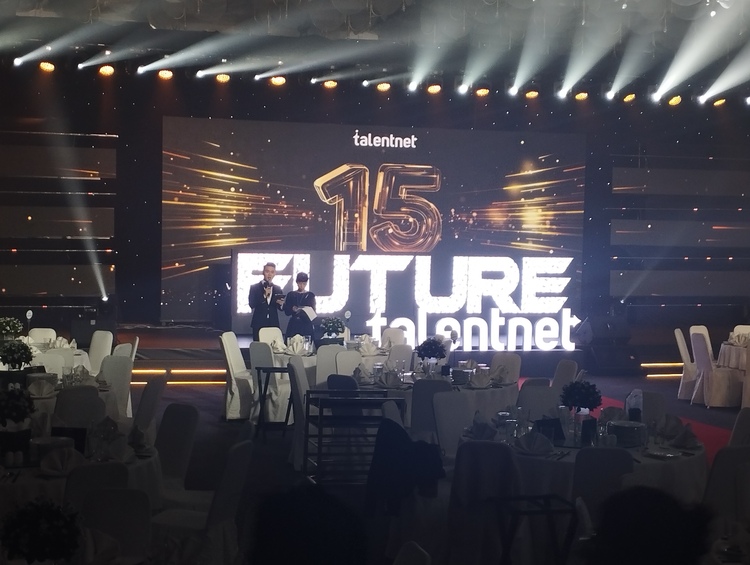In today's era, the use of projection devices such as LED screens and projectors is becoming increasingly popular. These technologies deliver unique image and video experiences, suitable for work and home entertainment spaces. Let's Luxmage explores the differences between these two types of devices to better understand how they affect your experience
LED (Light Emitting Diode) screens are an advanced type of display that uses light-emitting diodes like pixels to create images and videos. One of the outstanding features of this screen is the ability to display without using backlight, which helps reduce the thickness of the screen and increase brightness.
.jpg)
The size of the LED screen can reach 1,070 m2, but the resolution can be reduced when manufacturers combine small-sized screen panels together. Although the resolution may be reduced, the important advantage is the flexibility in size and resolution, which makes LED screens suitable for diverse design needs of users.
LED screens are highly durable, can be used for more than 10,000 hours, while maintaining stable display quality. This makes it a superior choice for applications that require stability and reliability, such as in large events, outdoor advertising, and other commercial applications.
With very high brightness, LED screens are often used to display content in places with strong light, such as in suburban events. Applications of LED screens are very diverse:
All of these applications demonstrate the flexibility and utility of LED displays in many different fields.
A projector , also known as a "projector" in English, is an optical device that converts image data from an input source into large-sized images on a flat surface such as a projection screen. Projectors are widely used in a variety of contexts, from education and business to entertainment and event presentations.
A typical projector includes the following main components:

Some types of projectors use DLP (Digital Light Processing) or LCD (Liquid Crystal Display) technology to create images. Meanwhile, laser projectors are becoming popular, providing high lighting efficiency and good color accuracy. Projectors can be connected to a variety of input sources such as computers, laptops, gaming consoles, and other multimedia devices.
The applications of projectors are diverse, from showing lectures and business presentations to watching movies and organizing large projection events. The convenience and versatility of the projector have made it an important tool in sharing information and entertainment.
Projectors and LED screens are not just common display technologies, but they are also multi-talented "presenters", providing top-notch visual experiences in many different fields.
Presenting and teaching: Projectors are powerful allies in the world of education and business. Thanks to them, presentations and teaching sessions become more vivid, attractive and easier to understand. It's not just about projecting images from a computer, but about turning each table of data, image or video into a visual and impressive story.
Conferences and meetings: In the corporate space, professional projectors not only transmit data but also increase interactivity in meetings. You can share ideas and discuss details with vivid images and graphics, making meetings more creative and effective.

Watch movies and experience videos: LED screens and projectors have changed the way we experience entertainment. From cinemas to home entertainment corners, they create expansive visual spaces where every smallest detail on the screen is felt. The vivid lighting and realism of the images make each moment unique and intimate.
Outdoor advertising: Large outdoor LED screens are not just an advertising tool, but digital art that creates emotions. They can transform advertising messages into dynamic experiences, highlighting every idea and capturing the attention of passersby.
Events and exhibitions: At events and exhibitions, projectors and LED screens not only present information in a conventional way, but highlight the space and create an interactive context. Performances, music events, and art exhibitions come to life, transporting audiences into a colorful world.
Information display: In public areas, such as train stations, airports, or shopping centers, LED screens are smart "guides". They help display schedule information, news, and advertisements in a flexible and unique way.
Branding and marketing: LED screens are not only advertising tools but also unique nameplates for brands. Integrating this screen technology into the business space creates a strong and unique impression.
In total, projectors and LED screens are not just display technologies, but digital artists, which are enhancing user experience and opening up the space for endless creativity.
One of the things that is especially notable when comparing LED screens and projectors is the brightness they can produce.
Brightness
LED screens are usually brighter than projectors. For high quality LED screens, brightness can be up to 10,000 nits outdoors and 2,000 nits indoors. This makes them ideal for use in bright environments such as outdoor events. In contrast, projectors require a dark environment for optimal display.
Projectors often struggle when there is ambient light, like at outdoor music events. LED screens are the obvious choice in these situations, keeping images vivid without being affected by ambient light.
Both LED screens and projectors come in a variety of resolutions, from HD to UHD. LED screens have customizable resolutions and support HDR, while projectors are more suitable for smaller screen sizes.
(3)(3).jpg)
LED screens typically have higher contrast ratios, providing better picture quality and more vivid colors. LED screens are capable of going completely black, while projectors require an external contrast screen.
LED screens have a wider viewing angle, suitable for a larger audience. In contrast, projectors are suitable for smaller audiences.
LED screens often provide better image quality, with high resolution and diverse color display capabilities. Projectors may have difficulty displaying deep colors such as black.
Projectors typically have lower color temperatures and consume less power than LED screens.
Projectors are easier to install and require less maintenance than LED screens. LED screens have a more complicated installation process and require less maintenance but are more effective.
The initial cost of an LED screen is usually slightly higher than that of a projector of equivalent quality.
In short, choosing between LED screens and projectors depends on specific usage needs and environmental conditions.
Luxmage is known as a reputable and quality LED screen installation unit, and is the partner of choice for many businesses and organizations. With many years of experience in the field of providing LED display solutions, Luxmage has created impressive projects, marking creativity and professionalism.
Luxmage customers often praise the premium product quality and excellent customer service. Their dedicated team of technicians not only has in-depth knowledge but also masters the most advanced technology. This helps Luxmage carry out LED screen installation projects with high precision and stable performance. In particular, Luxmage is committed to ensuring effectiveness and uniqueness in every detail of its products. Strict quality testing processes ensure that every LED display installed by Luxmage meets or exceeds industry-leading quality standards.
With constant innovation and industry-leading vision, Luxmage is not only a reputable LED screen rental unit but also a reliable partner for all your LED display needs. Please contact Luxmage to receive the fastest and most accurate advice.
Vi Luc Technology Co., Ltd. - LUXMAGE
Address: 80, Street 9, Ward 9, Go Vap District, City. HCM
Hotline: 0988.895.066
Email: sale@luxmage.com
Hot news
Project Reference

Posted by: marketingluxmage - Date: 09-12-2023
Last Page: ADVANTAGES OF HALL LED SCREEN
Next Page: TRANSPARENT LED SCREEN TRENDS 2024
- Enterprise LED Display | Central Display Solution for Operations & Digital Transformation
- LED Display Solutions for Businesses | Central Display Systems
- Enterprise Digital Meeting Room Systems | A Display Platform for Digital Transformation
- Top 5 High-Resolution Conference Room LED Displays That Replace Projectors
